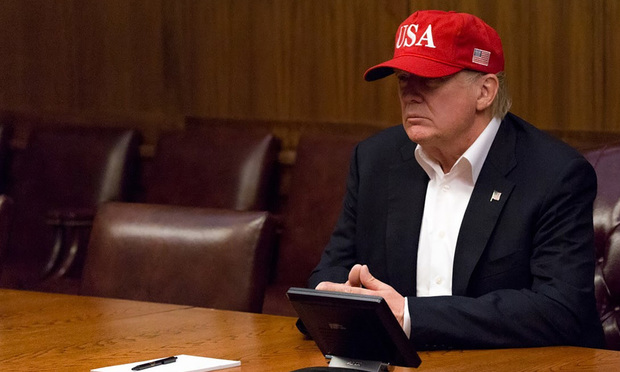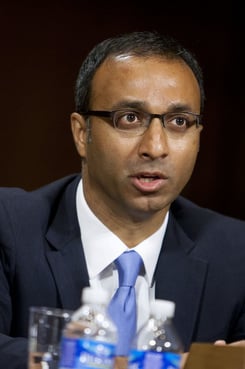Trump's Tweets Could Undercut Feds' Silence in Public Records Case
In a FOIA case about the "Russia dossier," U.S. District Judge Amit Mehta in Washington is considering what President Trump may or may not know when he tweets.
November 17, 2017 at 01:56 PM
4 minute read
 President Donald Trump. Credit: Shealah Craighead/ White House
President Donald Trump. Credit: Shealah Craighead/ White House The government's so-called Glomar responses in a federal public records case in Washington could be undercut by the president's tweeting habits.
The FBI is defending its refusal to either confirm or deny the existence of certain documents in response to a Freedom of Information Act suit against the bureau and other agencies. At a hearing Friday, U.S. District Judge Amit Mehta struggled with whether the president's tweets, which the government conceded are official statements, undercut that refusal.
The plaintiffs, Politico reporter Josh Gerstein and the James Madison Project, want the federal agencies to turn over a two-page synopsis they reportedly have on the claims in the “Russia dossier,” an unverified document that made claims about the president. Gerstein also seeks any determination by the agencies as to the validity of the dossier, and any records about what effort, if any, federal officials made to investigate the validity.
Gerstein's lawyers, Brad Moss and Mark Zaid, argue that because Trump has tweeted that the dossier is “fake,” and other unofficial statements from former officials such as James Comey indicate intelligence agencies have reviewed it, the government has essentially already disclosed that the documents exist and therefore can't make a Glomar response.
Workers of firm involved with the discredited and Fake Dossier take the 5th. Who paid for it, Russia, the FBI or the Dems (or all)?
— Donald J. Trump (@realDonaldTrump) October 19, 2017
Much of the case relies on a precedent set in a 2013 Freedom of Information Act case, in which the ACLU sought documents related to the Obama administration's use of drone strikes. In that case, the D.C. Circuit ruled that even though the CIA had not officially said it used drone strikes, other statements from officials, including then-President Barack Obama, indicated it was “neither logical nor plausible” that the CIA did not at least have an interest in the issue and had documents on it.
Mehta pushed Moss to explain how or why they believed Trump tweeted information about the dossier that he learned from federal agencies. Moss said the plaintiffs didn't know, but that under D.C. Circuit case law, the default is to presume that when the government makes an official statement, it is done in the course of official duties and therefore relies on official information.
 U.S. District Judge Amit Mehta. Credit: Diego M. Radzinschi / ALM
U.S. District Judge Amit Mehta. Credit: Diego M. Radzinschi / ALMMehta posed the same question to Justice Department lawyer David Glass, who represents the agencies along with Elizabeth Shapiro. The judge asked specifically about tweets in which Trump said the dossier was “fake” or “unverified.”
“Why shouldn't I infer … that an affirmative statement that [the dossier is] discredited is not based upon official information?” the judge asked.
“Because he didn't say so,” Glass replied. Glass said the dossier was presumed to be about the president himself, so he could have been tweeting based on his own personal knowledge or even based on news reports.
While the FBI has given the Glomar response with respect to all documents Gerstein requested, the other agencies have confirmed the existence of the two-page synopsis. However, they are not releasing it on the grounds that it contains classified information.
The judge said he would try to make a decision soon, but appeared puzzled by the question the case presented.
“A lot of food for thought,” Mehta said, before ending the argument.
Read more:
Trump's Tweets Are 'Official Statements,' Feds Tell Court
@realDonaldTrump's Tweets Are 'Authority' in Advocates' New Travel Ban Filings
President Trump's Immunity Claims Face Scrutiny in Twitter Suit
Cleary Gottlieb Publishes Trump 'Social Media Attack' Survival Guide
This content has been archived. It is available through our partners, LexisNexis® and Bloomberg Law.
To view this content, please continue to their sites.
Not a Lexis Subscriber?
Subscribe Now
Not a Bloomberg Law Subscriber?
Subscribe Now
NOT FOR REPRINT
© 2025 ALM Global, LLC, All Rights Reserved. Request academic re-use from www.copyright.com. All other uses, submit a request to [email protected]. For more information visit Asset & Logo Licensing.
You Might Like
View All
Apple Files Appeal to DC Circuit Aiming to Intervene in Google Search Monopoly Case
3 minute read

DC Circuit Revives Firefighters' Religious Freedom Litigation in Facial Hair Policy Row
3 minute read
DC Judge Chutkan Allows Jenner's $8M Unpaid Legal Fees Lawsuit to Proceed Against Sierra Leone
3 minute readTrending Stories
- 1Two Wilkinson Stekloff Associates Among Victims of DC Plane Crash
- 2Two More Victims Alleged in New Sean Combs Sex Trafficking Indictment
- 3Jackson Lewis Leaders Discuss Firm's Innovation Efforts, From Prompt-a-Thons to Gen AI Pilots
- 4Trump's DOJ Files Lawsuit Seeking to Block $14B Tech Merger
- 5'No Retributive Actions,' Kash Patel Pledges if Confirmed to FBI
Who Got The Work
J. Brugh Lower of Gibbons has entered an appearance for industrial equipment supplier Devco Corporation in a pending trademark infringement lawsuit. The suit, accusing the defendant of selling knock-off Graco products, was filed Dec. 18 in New Jersey District Court by Rivkin Radler on behalf of Graco Inc. and Graco Minnesota. The case, assigned to U.S. District Judge Zahid N. Quraishi, is 3:24-cv-11294, Graco Inc. et al v. Devco Corporation.
Who Got The Work
Rebecca Maller-Stein and Kent A. Yalowitz of Arnold & Porter Kaye Scholer have entered their appearances for Hanaco Venture Capital and its executives, Lior Prosor and David Frankel, in a pending securities lawsuit. The action, filed on Dec. 24 in New York Southern District Court by Zell, Aron & Co. on behalf of Goldeneye Advisors, accuses the defendants of negligently and fraudulently managing the plaintiff's $1 million investment. The case, assigned to U.S. District Judge Vernon S. Broderick, is 1:24-cv-09918, Goldeneye Advisors, LLC v. Hanaco Venture Capital, Ltd. et al.
Who Got The Work
Attorneys from A&O Shearman has stepped in as defense counsel for Toronto-Dominion Bank and other defendants in a pending securities class action. The suit, filed Dec. 11 in New York Southern District Court by Bleichmar Fonti & Auld, accuses the defendants of concealing the bank's 'pervasive' deficiencies in regards to its compliance with the Bank Secrecy Act and the quality of its anti-money laundering controls. The case, assigned to U.S. District Judge Arun Subramanian, is 1:24-cv-09445, Gonzalez v. The Toronto-Dominion Bank et al.
Who Got The Work
Crown Castle International, a Pennsylvania company providing shared communications infrastructure, has turned to Luke D. Wolf of Gordon Rees Scully Mansukhani to fend off a pending breach-of-contract lawsuit. The court action, filed Nov. 25 in Michigan Eastern District Court by Hooper Hathaway PC on behalf of The Town Residences LLC, accuses Crown Castle of failing to transfer approximately $30,000 in utility payments from T-Mobile in breach of a roof-top lease and assignment agreement. The case, assigned to U.S. District Judge Susan K. Declercq, is 2:24-cv-13131, The Town Residences LLC v. T-Mobile US, Inc. et al.
Who Got The Work
Wilfred P. Coronato and Daniel M. Schwartz of McCarter & English have stepped in as defense counsel to Electrolux Home Products Inc. in a pending product liability lawsuit. The court action, filed Nov. 26 in New York Eastern District Court by Poulos Lopiccolo PC and Nagel Rice LLP on behalf of David Stern, alleges that the defendant's refrigerators’ drawers and shelving repeatedly break and fall apart within months after purchase. The case, assigned to U.S. District Judge Joan M. Azrack, is 2:24-cv-08204, Stern v. Electrolux Home Products, Inc.
Featured Firms
Law Offices of Gary Martin Hays & Associates, P.C.
(470) 294-1674
Law Offices of Mark E. Salomone
(857) 444-6468
Smith & Hassler
(713) 739-1250








